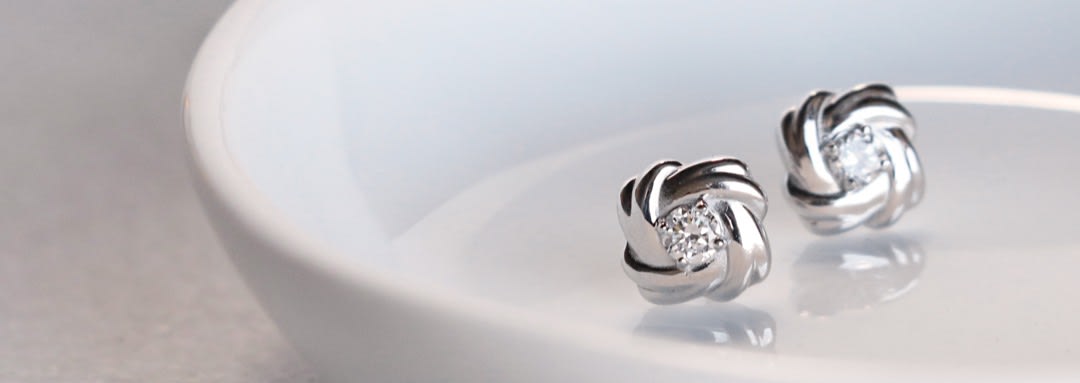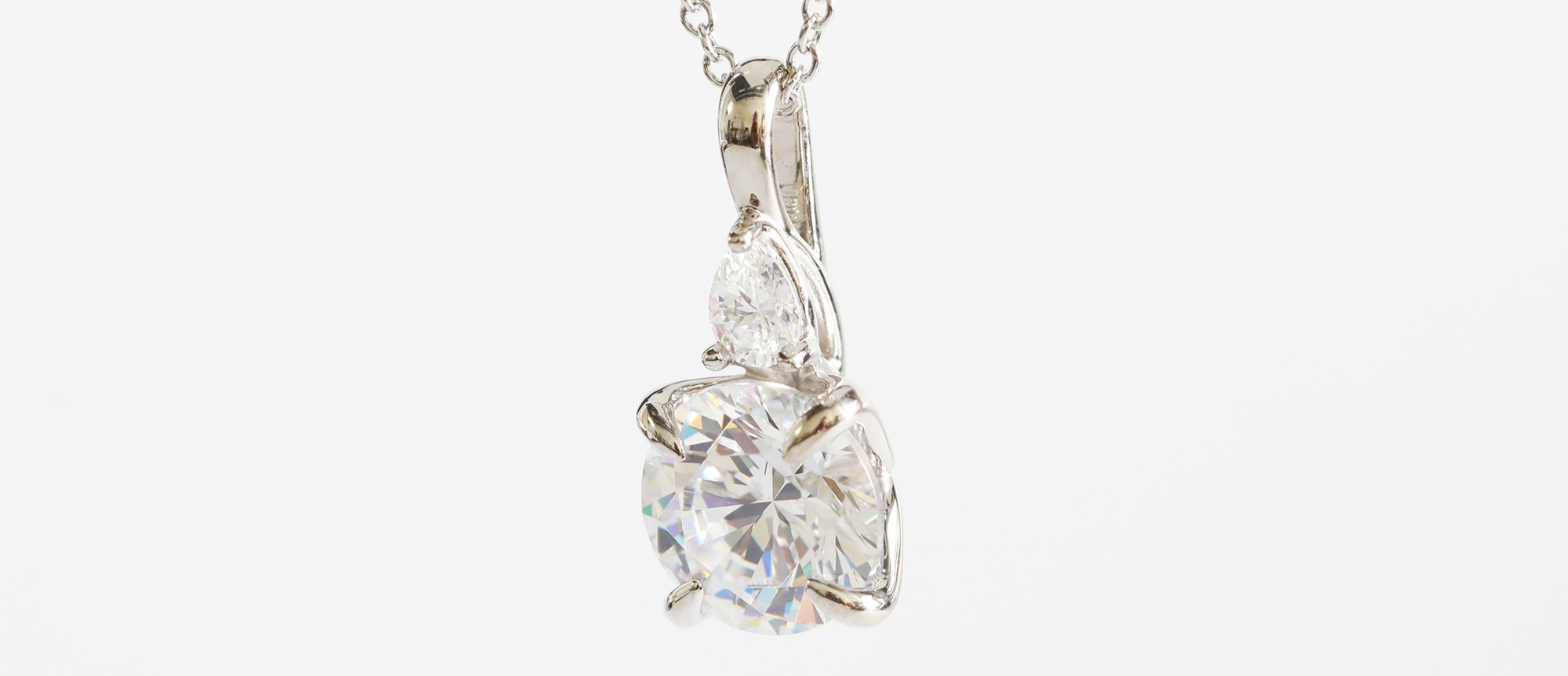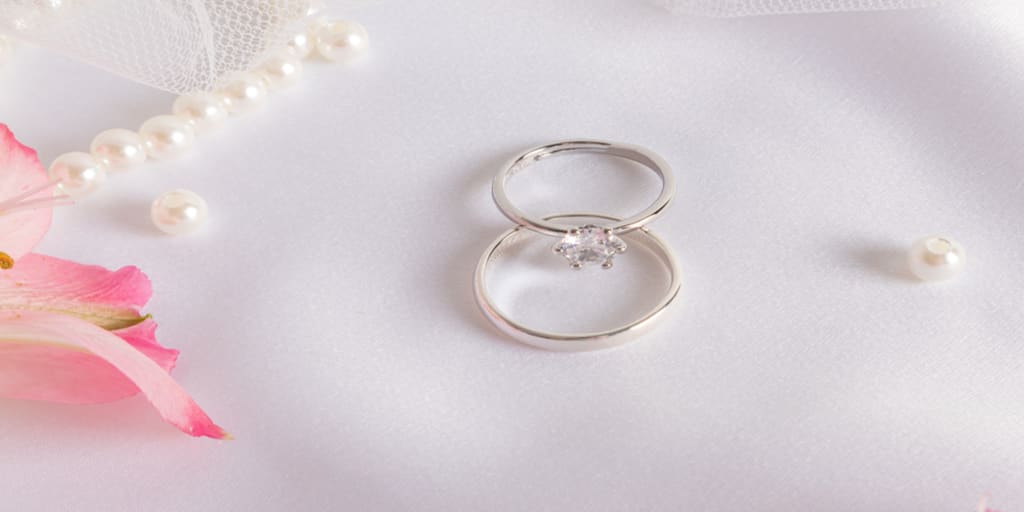To the untrained eye, sterling silver and white gold can appear almost identical. Both offer gleaming, grayish-white shine and offer a cool-toned alternative to yellow gold. But what exactly is the difference between the two?
Of course, there is the obvious difference: white gold is gold, and sterling silver is silver. But there are ample reasons why buyers of quality diamond alternative jewelry might go out of their way to choose pieces made from one metal versus the other.
If you’re looking to invest in a necklace, earrings, or engagement ring, it’s worth quickly learning the key attributes of sterling silver vs white gold in order to arrive at a more informed and intentional decision. Then, you’ll be able to pick a piece that makes you shine with delight.

An Overview of White Gold
Unlike its storied sibling, yellow gold, which is a naturally occurring element, white gold is a combination, or alloy, of gold and at least one other white metal. Typically, the other metal is one of the following:
- Palladium
- Silver
- Zinc
- Manganese
- Nickel
The percentage of pure gold used in white gold is usually around 75%. That said, it can drop to under 50% and still be considered white gold.
If you’re wondering about the percentage of gold that a white gold piece contains, you can find that answer by checking its caratage and the types of alloy used.
Pure gold has 24 carats, so accordingly, white gold that is 75% pure is 18 carats. On the other hand, rose gold is also made with 75% pure gold alloyed with copper and sometimes silver. Fewer carats equals a less purely gold alloy, but the overall quality of the white gold engagement rings, white gold earrings, or any jewelry piece will still depend in part on the other metals that are included.
While the alloy of gold and white metals can have a fainter hue than pure gold, it can still appear somewhat yellow. What gives it a brilliant, almost colorless radiance is the rhodium plating used on white gold jewelry pieces like white gold necklaces and white gold bracelets.
So, does white gold tarnish? Extremely durable and corrosive-resistant, rhodium is an ideal plating material because it helps protect the integrity and shape of the ring. That said, the rhodium coating does need to be touched up from time to time, meaning that this metal can require some maintenance. So, be sure to check the manufacturer’s instructions or read guides about how to clean white gold jewelry.
An Introduction to Sterling Silver
Similar to white gold, sterling silver is also an alloy. But instead of being a gold alloy, sterling silver is an alloy metal of silver and other metals (usually copper).
Unlike white gold, the percentage of silver in sterling silver is fixed at 92.5%. Because it’s so hard to tell the difference between sterling silver and less pure lookalikes with the naked eye, sterling silver jewelry is almost always stamped with a “.925” signature. Check for this mark before buying any sterling silver pieces.
The reason sterling silver is alloyed with other metals is because pure silver is extremely soft—so soft that it simply can’t be used to make forks, platters, or even jewelry. The addition of copper makes the material much more durable. However, the alloy also requires more upkeep, since copper reacts in the presence of oxygen and can show signs of tarnish over time.
Since pure silver is hypoallergenic, sterling silver is often a smart choice for people with sensitive skin, as long as they aren’t allergic to copper.
How Much Should You Spend?
When deciding between two metals, it’s always helpful to learn the cost of the metal itself before honing in on actual plated jewelry pieces. We’ll lay out the cost of sterling silver vs white gold below:
- White gold – Currently, 18-carat white gold is sitting at about $44 per gram, though this price fluctuates.
- Sterling silver – Compare that to the price of a gram of sterling silver, which is currently appraised at about $.60 per gram, and you’ll start to get a sense of their relative values.
The reason white gold is more expensive is that it contains such a high percentage of gold, a rarer metal that has always been considered extremely valuable. Silver, on the other hand, is far more plentiful in the world and significantly easier to extract.
For a blend of affordability and beauty, sterling silver can be a wonderful choice. But while 18-carat white gold can carry hefty price tags, keep in mind that there are lower-carat options that can bring the expense of white gold jewelry down a few notches.
Still, no buyer should make their decision based on price alone. Other factors, like durability and the care required to maintain the piece, are needed to make a knowledgeable decision.
How Long Do White Gold and Sterling Silver Last?
The expected lifetime of your jewelry should always play a role in your choosing process. Since white gold is plated jewelry, you don’t need to worry about the alloyed metal becoming scratched or dented—its ultra-strong rhodium coating will protect it.
That said, rhodium plating can wear away with use, typically after about 12–18 months of regular wear. Contact with chemicals, other metals, and abrasive materials can speed up this process. While it isn’t too expensive to have your white gold jewelry re-plated, the frequency can add up over the years.
In contrast, sterling silver is significantly softer than white gold, which means it can be more prone to nicks and scratches. As mentioned, without regular polishing, it can also tarnish. The life cycle of a sterling silver ring is about twenty to thirty years. However, with regular maintenance, that period can be extended.
How Often Can You Wear White Gold Or Sterling Silver?
No matter which metal you choose, some tips on care and maintenance can help you make the most of their appearance and extend their wearability. White gold jewelry can be worn daily, but there are some major caveats. You’ll want to remove your white gold pieces while:
- In the shower
- In the pool
- While exercising
- While cleaning
The reason is that sweat, chlorine, water, and the chemicals found in household cleaners can hasten the erosion of the rhodium plating on white gold jewelry, leading to a yellowish pallor.
Sterling silver, on the other hand, is a bit trickier. Due to its softness, everyday use is possible, but not necessarily recommended. Additionally, avoid wearing sterling silver when:
- In the shower
- Washing your hands
- Handling sharp objects or metal
- In the pool
- Participating in outdoor activities
Sterling silver is also sensitive to heat and light, so even if you aren’t hopping in the water, it’s better to never wear your pieces poolside.
Sterling Silver vs White Gold Jewelry Care: The Basics
Although wear and tear are possible, there are many steps you can take at home to prevent damage to your jewelry. Regular cleaning, as well as scheduled maintenance and inspections, can go a long way toward extending the sparkle of your favorite pieces.
The following tips are suitable for both white gold and sterling silver:
- Eliminate sources of damage – Reduce the chance of chemical or mineral buildup on your jewelry by removing it before you shower, clean, apply makeup, work out, or use hair products. If you own a ring, remove it before applying hand sanitizer.
- Clean jewelry with baking soda – This is a quick step you can take at home in the event your jewelry gets dirty. In a bowl, mix distilled warm water with pure baking soda to create a thin paste. Scoop the paste onto your jewelry with a toothbrush and gently rub until impurities are removed.
- Don’t experiment with cleaners – Online, you’ll find all kinds of tips about formulations and chemicals that can be used to clean jewelry at home, like window cleaners and bleach. But it’s better to avoid harsh chemicals if you’re not sure what effects they’ll have, as these could potentially damage your jewelry permanently. When in doubt, ask a local jeweler for advice—or better yet, take your piece in for professional cleaning.

White Gold or Sterling Silver: How to Choose?
When it comes to the showdown between white gold vs sterling silver, which wins overall? With so many factors, it can be hard to assess the two together. But below, we’ve laid out some important pros and cons of each material for your consideration.
Let’s see how sterling silver and white gold compare side-by-side:
| Metal | Pros | Cons |
| White Gold | Extremely Durable | More costly than sterling silver |
| Ample engagement ring options | Rhodium plating requires maintenance | |
| Doesn’t tarnish or corrode | Not hypoallergenic | |
| Sterling Silver | More affordable | Soft material susceptible to wear |
| Usually safe for sensitive skin | Tarnishes easily | |
| Extremely versatile | Shorter lifetime |
Find Your Next Piece of Jewelry With Diamond Nexus
Choosing a jewelry piece is an extremely personal decision and deciding which metal you want to add to your collection is an important part of this process. But no matter which option you ultimately select, the attention you give to its care can go a long way toward ensuring it sparkles for years to come.
At Diamond Nexus, we know how difficult it can be to make the right choice—which is why we’re with you every step of the way.
We’re committed to creating superior pieces that create memories and show off your style. With our Lifetime Stone guarantee, you can select a gorgeous stone that won’t chip or wear (or we’ll replace it). Plus, all of our pieces are covered by our Everything’s Covered Plan, a one-year protection plan that includes metal repairs, polishing, and inspections, in addition to shipping.
Choose your next statement piece, whether that’s a white gold ring or a sterling silver bracelet, with Diamond Nexus. Or, visit our site to learn more about our patented Nexus Diamond™ alternatives and our array of handcrafted pieces.
Sources:
U.S. Geological Survey. What is White Gold? https://www.usgs.gov/faqs/what-white-gold
Southern Living. Does Sterling Silver Tarnish? What You Need to Know. https://www.southernliving.com/does-sterling-silver-tarnish
Sciencing. What Causes Copper to Tarnish? https://sciencing.com/causes-copper-tarnish-13011.html
Frugal Reality. White Gold Price: 10k, 14k, and 18k Differences & Cost. https://frugalreality.com/white-gold-price-10k-14k-18k/
Coin Bin. Sterling Silver Price Per Gram. https://coinbin.com/sterling-silver-price-per-gram/
